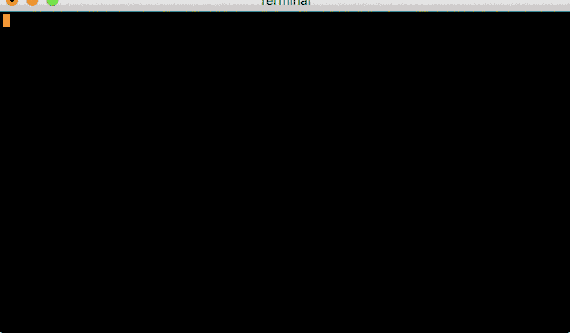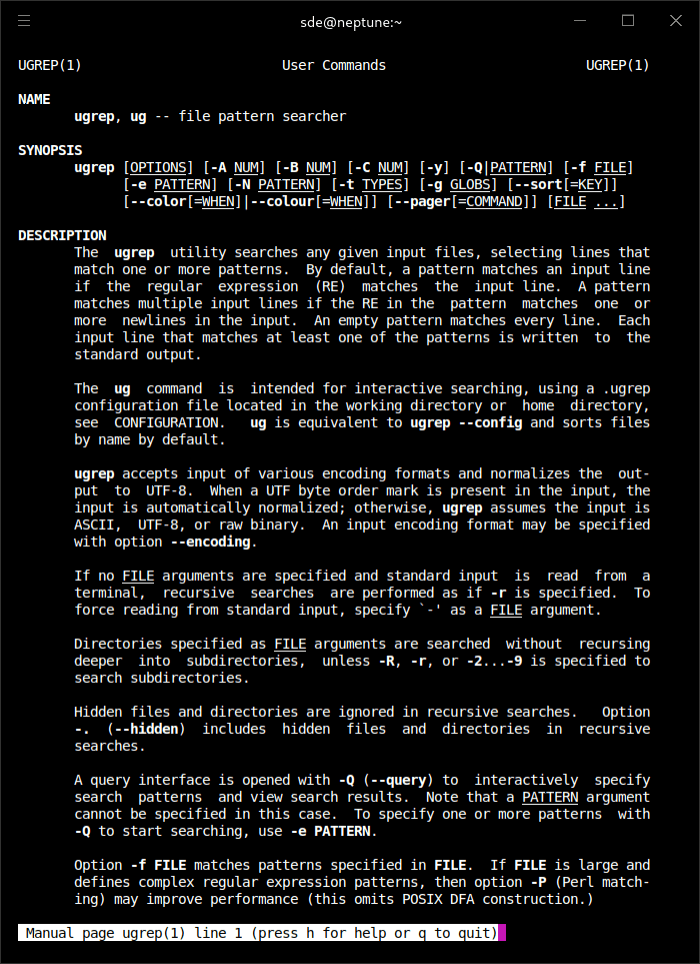The ugrep utility searches any given input files, selecting lines that match one or more patterns.
By default, a pattern matches an input line if the regular expression (RE) matches the input line. A pattern matches multiple input lines if the RE in the pattern matches one or more newlines in the input. An empty pattern matches every line. Each input line that matches at least one of the patterns is written to the standard output.
This is free and open source software.
Features include:
- Ultra fast with new match algorithms and features beating grep, ripgrep, silver searcher, ack, sift, etc.
- Cross-platform support – runs under Linux, macOS, Windows, and more.
- Supports all GNU/BSD grep standard options; ugrep is a faster compatible replacement for GNU/BSD grep.
- Matches Unicode patterns by default in UTF-8, UTF-16, UTF-32 encoded files.
- Matches multiple lines with \n and \R regex patterns.
- Built-in help: ugrep –help WHAT displays options related to WHAT you are looking for
- User-friendly with sensible defaults and customizable configuration files used by the ug command intended for interactive use that loads a .ugrep configuration file with your preferences.
- Interactive query TUI, press F1 or CTRL-Z for help and TAB/SHIFT-TAB to navigate to dirs and files.
- Find approximate pattern matches with fuzzy search, within the specified Levenshtein distance.
- Search with Google-like Boolean query patterns using
--boolpatterns. - Fzf-like search with regex (or fixed strings with -F), fuzzy matching with up to 4 extra characters.
- Search the contents of archives (cpio, jar, tar, pax, zip) and compressed files (zip, gz, Z, bz, bz2, lzma, xz, lz4, zstd).
- Search pdf, doc, docx, xls, xlxs, and more using filters.
- Search binary files and display hexdumps with binary pattern matches (Unicode text or -U for byte patterns).
- Include files to search by filename extensions or exclude them.
- Include files to search by file types or file “magic bytes” or exclude them.
- Include files and directories to search that match gitignore-style globs or exclude them.
- Include hidden files (dotfiles) and directories to search (omitted by default).
- Exclude files specified by .gitignore etc.
- Search patterns excluding negative patterns (“match this but not that”).
Website: github.com/Genivia/ugrep
Support:
Developer: Robert van Engelen
License: BSD 3-Clause “New” or “Revised” License


ugrep is written in C++. Learn C++ with our recommended free books and free tutorials.
| Popular series | |
|---|---|
| The largest compilation of the best free and open source software in the universe. Each article is supplied with a legendary ratings chart helping you to make informed decisions. | |
| Hundreds of in-depth reviews offering our unbiased and expert opinion on software. We offer helpful and impartial information. | |
| The Big List of Active Linux Distros is a large compilation of actively developed Linux distributions. | |
| Replace proprietary software with open source alternatives: Google, Microsoft, Apple, Adobe, IBM, Autodesk, Oracle, Atlassian, Corel, Cisco, Intuit, and SAS. | |
| Awesome Free Linux Games Tools showcases a series of tools that making gaming on Linux a more pleasurable experience. This is a new series. | |
| Machine Learning explores practical applications of machine learning and deep learning from a Linux perspective. We've written reviews of more than 40 self-hosted apps. All are free and open source. | |
| New to Linux? Read our Linux for Starters series. We start right at the basics and teach you everything you need to know to get started with Linux. | |
| Alternatives to popular CLI tools showcases essential tools that are modern replacements for core Linux utilities. | |
| Essential Linux system tools focuses on small, indispensable utilities, useful for system administrators as well as regular users. | |
| Linux utilities to maximise your productivity. Small, indispensable tools, useful for anyone running a Linux machine. | |
| Surveys popular streaming services from a Linux perspective: Amazon Music Unlimited, Myuzi, Spotify, Deezer, Tidal. | |
| Saving Money with Linux looks at how you can reduce your energy bills running Linux. | |
| Home computers became commonplace in the 1980s. Emulate home computers including the Commodore 64, Amiga, Atari ST, ZX81, Amstrad CPC, and ZX Spectrum. | |
| Now and Then examines how promising open source software fared over the years. It can be a bumpy ride. | |
| Linux at Home looks at a range of home activities where Linux can play its part, making the most of our time at home, keeping active and engaged. | |
| Linux Candy reveals the lighter side of Linux. Have some fun and escape from the daily drudgery. | |
| Getting Started with Docker helps you master Docker, a set of platform as a service products that delivers software in packages called containers. | |
| Best Free Android Apps. We showcase free Android apps that are definitely worth downloading. There's a strict eligibility criteria for inclusion in this series. | |
| These best free books accelerate your learning of every programming language. Learn a new language today! | |
| These free tutorials offer the perfect tonic to our free programming books series. | |
| Linux Around The World showcases usergroups that are relevant to Linux enthusiasts. Great ways to meet up with fellow enthusiasts. | |
| Stars and Stripes is an occasional series looking at the impact of Linux in the USA. | |
